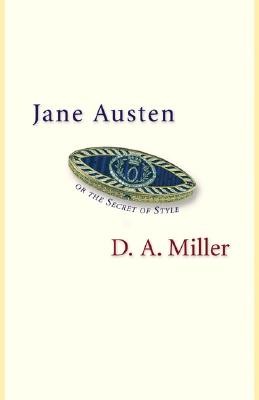| Jane Austen, or the Secret of Style Contributor(s): Miller, D. A. (Author) |
|
 |
ISBN: 069112387X ISBN-13: 9780691123875 Publisher: Princeton University Press OUR PRICE: $26.55 Product Type: Paperback - Other Formats Published: August 2005 Annotation: "In addition to being an essential book on Austen, this is the smartest, not to mention the most stylish, discussion of style there is. Miller approaches this forbiddingly elusive concept and beautifully captures its weirdness and its emotional complexity. This book has a heart, as well as an art, to go with its brains."--Joseph Litvak, "Novel" "D. A. Miller's exquisite, original, meditative, and provocative volume [is] written in a style that is like a collision between Austen herself and the more epigrammatic modes of Roland Barthes. . . . Miller is continually provocative, but in an allusive, highly crafted-stylish-way: writing which is the product of deep immersion in Austen's fiction and its affect."--Kate Flint, "Studies in English Literature, 1500-1900" |
| Additional Information |
| BISAC Categories: - Literary Criticism | English, Irish, Scottish, Welsh |
| Dewey: 813.7 |
| Physical Information: 0.39" H x 5.56" W x 8.42" (0.38 lbs) 128 pages |
| Themes: - Cultural Region - British Isles |
| Descriptions, Reviews, Etc. |
| Publisher Description: What is the world-historical importance of Jane Austen? An old maid writes with the detachment of a god. Here, the stigmatized condition of a spinster; there, a writer's unequalled display of absolute, impersonal authority. In between, the secret work of Austen's style: to keep at bay the social doom that would follow if she ever wrote as the person she is. For no Jane Austen could ever appear in Jane Austen. Amid happy wives and pathetic old maids, we see no successfully unmarried woman, and, despite the multitude of girls seeking to acquire "accomplishments," no artist either. What does appear is a ghostly No One, a narrative voice unmarked by age, gender, marital status, all the particulars that make a person--and might make a person peculiar. The Austen heroine must suppress her wit to become the one and not the other, to become, that is, a person fit to be tied in a conjugal knot. But for herself, Austen refuses personhood, with all its constraints and needs, and disappears into the sourceless anonymity of her style. Though often treasured for its universality, that style marks the specific impasse of a writer whose self-representation is impossible without the prospect of shame. D.A. Miller argues this case not only through the close reading that Austen's style always demands, but also through the close writing, the slavish imitation, that it sometimes inspires. |